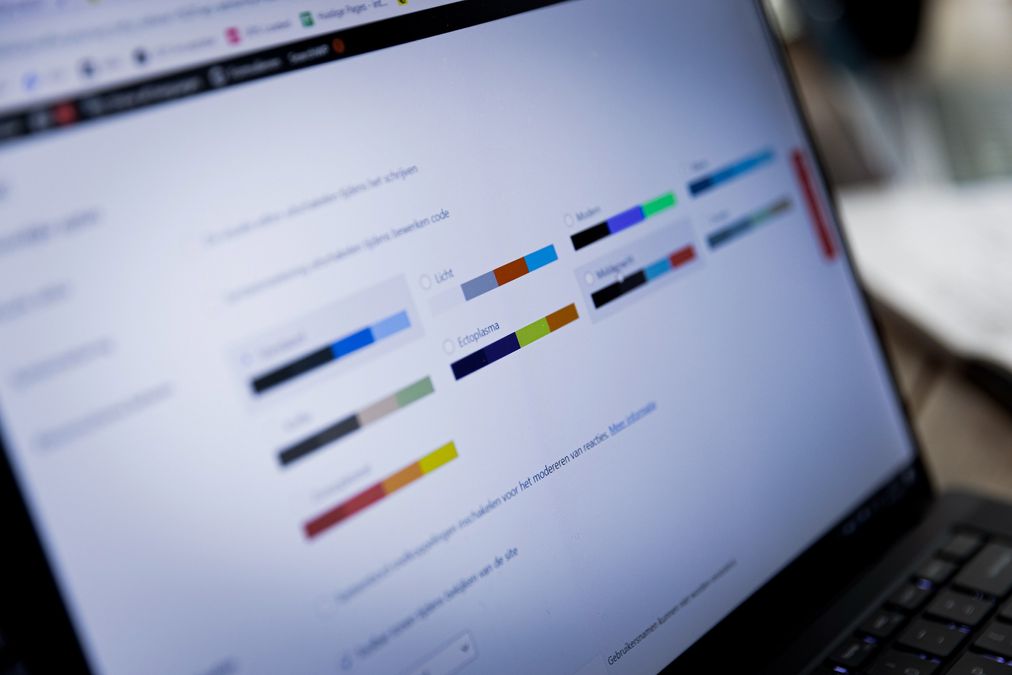Blog|Technologie
WordPress als Headless CMS
WordPress is een open source CMS (Content Management System) waarmee je eenvoudig een website of blog kunt maken en beheren. Het biedt een gebruiksvriendelijke interface waarmee je kunt schrijven, bewerken en publiceren van inhoud, zoals tekst, afbeeldingen en video’s. Ons WordPress CMS is ook voorzien van talloze plugins, koppelingen en andere extensies waarmee je het uiterlijk en de functionaliteiten van de website kunt toevoegen en aanpassen aan jouw behoeften.

Wat is WordPress?
Allereerst de basis: wat is WordPress nou eigenlijk? WordPress is een open source Content Management System (CMS) waarmee je gemakkelijk een website of blog kunt opzetten en beheren. Het is ontwikkeld in 2003 en heeft sindsdien aan populariteit gewonnen als een van de meest gebruikte CMS-systemen op het internet.
Met een WordPress website van Get Interactive kun je gemakkelijk teksten, afbeeldingen, video’s en andere media toevoegen en beheren op je website. Wij bieden ook een groot aantal ingebouwde functionaliteiten en de mogelijkheden om extra functies aan je website toe te voegen met behulp van de door ons ontwikkelde plug-ins. Wij hebben ervaring met het ontwikkelen en designen van unieke WordPress websites. Omdat iedere website volgens ons uniek moet zijn kan dat alleen als je een eigen identiteit ontwikkelt. Dit is bepalend voor de professionaliteit en het uiterlijk van je website. Wij zorgen er tevens voor dat je alles binnen het CMS gemakkelijk kunt aanpassen zonder dat je hoeft te coderen.
WordPress is gemakkelijk te leren en te gebruiken, zelfs voor mensen zonder al teveel technische vaardigheden. Het heeft een intuïtief beheersysteem en een rijk aanbod van hulpbronnen, waaronder forums, blogs en documentatie.
Wat is een Headless CMS?
Een headless CMS (Content Management System) is een soort CMS waarbij het beheer van de inhoud gescheiden is van de presentatie ervan. In tegenstelling tot traditionele CMS’s, die de inhoud presenteren via een voorgeformatteerd thema of layout, stelt een headless CMS de inhoud beschikbaar via een API (Application Programming Interface) die kan worden gebruikt door elk soort front-end platform of applicatie.
Dit betekent dat je met een headless CMS de inhoud kunt beheren en opslaan in een centrale omgeving, terwijl je de presentatie ervan kunt laten afhankelijk zijn van de specifieke behoeften van uw project. Bijvoorbeeld, je kunt de inhoud van een website beheren met een headless CMS, terwijl je de lay-out en het uiterlijk van de website aanpast met behulp van een aparte front-end framework, zoals React of Angular.
Headless CMS’s zijn populair geworden vanwege de flexibiliteit die ze bieden. Doordat de inhoud gescheiden is van de presentatie ervan, kun je deze op verschillende manieren gebruiken en hergebruiken, zoals in mobiele apps, chatbots of voice-assistenten. Als je bijvoorbeeld een website en een mobiele app hebt die dezelfde inhoud moeten presenteren, kun je deze inhoud beheren met een headless CMS en de presentatie ervan aanpassen aan de specifieke behoeften van elk platform.

Wat is het verschil tussen WordPress en een Headless CMS?
WordPress en headless CMS’s zijn beide nuttig voor het beheren van inhoud, maar ze zijn op verschillende manieren gericht. WordPress is een volledig geïntegreerd CMS (Content Management System) waarbij het beheer van de inhoud en de presentatie ervan samenkomen in één platform. Dit maakt het gemakkelijk om een website of blog snel op te zetten, maar het biedt minder flexibiliteit als het gaat om het gebruik van de inhoud op andere platforms.
Een headless CMS daarentegen biedt meer flexibiliteit omdat de inhoud gescheiden is van de presentatie ervan, maar het vereist meer werk om de inhoud te integreren met een front-end platform.
Wat zijn de voordelen
WordPress is een populaire “Content Management System” (CMS) die wordt gebruikt om websites en blogs op te zetten en te beheren. Een headless CMS is een CMS dat alleen de backend-functies van een website beheert, zonder een front-end lay-out of design te bieden. Hier zijn enkele voordelen van WordPress ten opzichte van een headless CMS:
- Gemakkelijk te gebruiken: WordPress is gemakkelijk te leren en te gebruiken, zelfs voor mensen zonder technische vaardigheden. Het biedt een intuïtief beheersysteem en een rijk aanbod van plug-ins en thema’s om je te helpen bij het opzetten en beheren van je website.
- Rijk aan functies: WordPress biedt een groot aantal ingebouwde functies en plug-ins om aan de behoeften van verschillende soorten websites te voldoen. Dit omvat ondersteuning voor blogs, e-commerce, formulieren, SEO en meer.
- Breed scala aan ondersteuning en hulpbronnen: WordPress heeft een grote en actieve gebruikersgemeenschap daardoor kunnen wij gemakkelijk en snel hulp en ondersteuning bieden bij het opzetten en beheren van je website. Er zijn talloze blogs, forums en andere hulpbronnen beschikbaar die kunnen helpen bij het oplossen van issues en het verbeteren van je website.
- Schaalbaar: WordPress is eenvoudig te gebruiken, zonder al te veel poespas. Wil je meer functionaliteiten dan alleen de basis, dan zijn echter wel kosten verbonden aan het gebruik van sommige plug-ins, maar deze zijn vaak nog steeds goedkoper dan het opzetten van een website met een headless CMS.
Een headless CMS kan echter ook zijn voordelen hebben, afhankelijk van de behoeften van een specifieke website. Het kan bijvoorbeeld meer flexibiliteit bieden als het gaat om het integreren van de CMS met andere systemen en het ontwerpen van de front-end van een website. Het is belangrijk om te overwegen wat het beste bij je doelen en behoeften past voordat je een beslissing maakt.
WordPress als Headless CMS
WordPress kun je inderdaad ook gebruiken als headless CMS (Content Management System). Dit houdt in dat je WordPress gebruikt om de inhoud te beheren en op te slaan, maar dat je een ander platform of applicatie gebruikt om de inhoud te presenteren.
Om WordPress te gebruiken als headless CMS, moet je ervoor zorgen dat de WordPress REST API is ingeschakeld. De REST API is een standaard manier om toegang te krijgen tot de inhoud van WordPress via een API-koppeling (Application Programming Interface). Je kunt dan de REST API gebruiken om de inhoud van je WordPress website op te halen en te gebruiken in elk soort front-end platform of applicatie.
Eenmaal ingeschakeld, kunt je de inhoud van WordPress beheren via de WordPress-beheeromgeving, zoals gebruikelijk. Vervolgens kunt je de REST API gebruiken om de inhoud op te halen en te integreren met een ander front-end platform, zoals een mobiele app of een statische website. Dit biedt de flexibiliteit om de inhoud op verschillende manieren te gebruiken en te presenteren.
Houd er wel rekening mee dat WordPress als headless CMS meer werk kan vergen dan het gebruik van een traditioneel, geïntegreerd CMS. Dit komt omdat je de inhoud moet integreren met een ander platform of applicatie, in plaats van dat dit geïntegreerd is in een vooraf ontwikkeld design of layout.
Als je overweegt om WordPress als headless CMS te gebruiken, neem dan contact met ons op. Wij zijn gespecialiseerd in maatwerk en in het bouwen van API-koppelingen.
We helpen je graag met de volgende stap!
Plan direct een gratis call met Pim!
Wil je meer weten over de cases uit jouw sector? Neem dan contact op met Pim, hij vertelt je er graag meer over en kijkt met je mee wat we voor jou kunnen betekenen.

